by Michelle Sutton-Kerchner
October is filled with national health observation days and awareness initiatives. Start one of your own. Simply be aware …
Where are you right now? The Exercise Floor, the office, the train, the dinner table? Did you bring your brain or is it elsewhere, churning out chatter from your day?
“Just Plain Old Tired” (F&W News, September 19, 2012) briefly discussed how making good use of time does not necessarily mean filling every second. Perhaps if our minds were present with the rest of our body, exhaustion would lessen. A “breather” in your day for deep breathing, meditative thinking, or simply enjoying the surroundings can be instantly refreshing. Yet, many reach for the first mobile device to absorb everything from the latest stock reports to Facebook updates. You may be “in the know,” yet some ancient philosophers would consider you lacking at the most basic level: true awareness.
For the skilled multitasker, being considered “lacking” because of the amazing ability to juggle multiple functions might seem off-putting. We pride ourselves on accomplishing by the heapful. If we fit a daily workout into that chaos, we cannot help but feel smug with our healthy (yet hectic) lifestyle. There lies the contradiction. When does healthy drive become an unhealthy process?
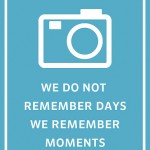 Modern society is obsessed with being busy. If you aren’t “doing,” there is fear of being considered lazy, unhealthy, or boring. Yet, there is a counter-theory based on the wellness of “being.” Existing: breathing, watching, listening, smelling, feeling. We cannot experience self-awareness and be present in our world when we are constantly occupying our time.
Modern society is obsessed with being busy. If you aren’t “doing,” there is fear of being considered lazy, unhealthy, or boring. Yet, there is a counter-theory based on the wellness of “being.” Existing: breathing, watching, listening, smelling, feeling. We cannot experience self-awareness and be present in our world when we are constantly occupying our time.
Those devices that connect us to the world may be the very instruments that cause us to feel lonely. Consider this scenario:
At every visit to the Center, Mr. Efficient hops on the elliptical with cell phone activated, ear buds connected, and fingers ready to run. He e-mails a colleague, texts his wife, and checks the weather (of course, to book his weekend accordingly). He throws a smile in the direction of other members. Then, he watches whatever show is on the overhead TV screen “for background noise.”
After this workout, filled with accomplishments on multiple levels, Mr. E seems to be missing something. He does not feel fully revived.
His counterpart, on the equipment next to him, shared a laugh with another member, exchanged a few thoughts with a passing personal trainer, and focused on his workout. He saw a workout buddy in the locker room where he lingered for an extra few minutes to discuss last Sunday’s game. He feels refreshed and content.
Both are in the same environment. Both have a different experience. As much as modern technology has allowed Mr. E to stay connected, in actuality, he is disconnected. Perhaps the lack he feels is a result of loneliness.
Lonely in a Crowd
According to Dr.’s Jacqueline Olds and Richard Schwartz, married authors of The Lonely American– Drifting Apart in the Twenty-First Century, “Americans in the 21st Century devote more technology to staying connected than any society in history, yet somehow the devices fail us: studies show that we feel increasingly alone.”
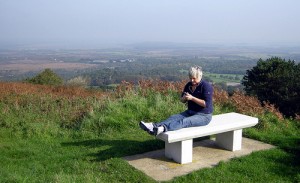
The authors claim many of their current patients are experiencing profound loneliness. Busy lifestyles filled with people and events make it difficult to recognize loneliness. And a desire to appear strong and capable renders one unable to outwardly admit loneliness, even if it is recognized.
Imagine how much we could absorb, and with which we could connect, if we simply were present. At the end of your day, you may remember encounters and experiences at a whole different level.
Some folks look around and see the crazy amount of accomplishments they managed in a day– and wonder if they did all that. There isn’t a recollection of the specifics. Motions were put into action without thought behind them. Our mind becomes harried; our bodies exhausted. Sure, we ate a healthy meal and did our cardio and strengthening like happy, healthy humans should. But did an overloaded agenda counteract some of the benefits?
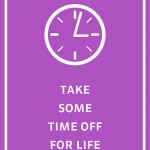 Was a friend’s visit over coffee enjoyed or was the time spent preoccupied with text messaging or a situation back at the office? Not being present is unhealthy for us and for those with whom we share our time. Even a wait in the check-out line can be an opportunity for growth. Small talk is a dying art. You can interact with another shopper over the season’s best tomatoes or remain statuesque, cell phone in hand, outputting and inputting the latest facts of the moment.
Was a friend’s visit over coffee enjoyed or was the time spent preoccupied with text messaging or a situation back at the office? Not being present is unhealthy for us and for those with whom we share our time. Even a wait in the check-out line can be an opportunity for growth. Small talk is a dying art. You can interact with another shopper over the season’s best tomatoes or remain statuesque, cell phone in hand, outputting and inputting the latest facts of the moment.
It is your moment. How do you choose to treat your brain? Your neighbor? The sales clerk? What was once rude is now so commonplace it is acceptable. Most teens don’t even have voice conversations. What does this imply about the health of society’s future? Satellite offices may thrive, but satellite relationships probably won’t fare as well.
When You Are “In The Moment”
Occasionally, we fill our time as a means of avoidance. Thoughts and feelings can sometimes be unpleasant. Rather than become self-aware and confront them, we quickly grab our smartphone, digital pad, or laptop. Technology even allows us to watch other shows during TV commercials with picture-in-picture features. Why endure idle time bombarded by advertising when we can catch the score.
Put it on mute– the TV, the phone, the candy begging for your attention. Take the moment to discover something about yourself. Identify what may be stressing you or causing anxiety. Identification can be half the challenge when we don’t take time to process. Don’t forget to contemplate what gives you joy. Often, we fail to celebrate personal accomplishments. We work diligently to achieve only to acknowledge them with a check mark on our never-ending lists.
Unplug to Stay Connected
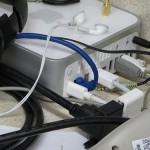
A combination of a struggling job market and rapidly evolving technology helped give birth to the modern workaholic. One survey of 6,500 executives discovered 85 percent of professionals were compelled to be on call around the clock. The compulsion occasionally resulted in disrupted sleep to check e-mails. This, after 84 percent admitted to checking their e-mail right before drifting to sleep.
Forget about the no-TV-in-the-bedroom rule. These cold statistics can have harsher ramifications on quality and quantity of sleep. Colder yet, a disgruntled sleep partner could rightfully banish you to the couch.
World initiatives exist with a mission to evaluate how we choose to use our time. One such program is termed the Slow Movement where time poverty is considered a cultural phenomenon. Ironically, the founders are striving for “connection,” yet probably not via more Wi-Fi hotspots.
They specify, “We want connection to people – ourselves, our family, our community, our friends, – to food, to place (where we live), and to life. We want connection to all that it means to live – we want to live a connected life.” As their name indicates, they suggest we slow down. Perhaps we cannot eliminate anything from our schedule today. However, we can focus on doing one task at a time.
There is a time and place for everything. Although it’s great to occasionally check on work from the Cycling studio or text from your pillow, frequent multitasking in these situations can be a disservice to our health. Concentrate on executing one job well, which can yield a multitude of results. Multitask and risk accomplishing several sloppy jobs, a sloppy mind, and– if physical activity is involved– an injury.
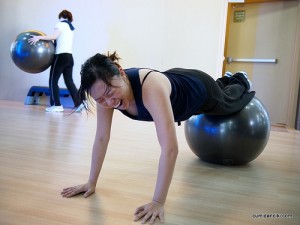
Exercise is the perfect example of improved results through mindful awareness. Mindful exercising can deliver instant results. When we notice our movement and adapt exercises accordingly, we listen to our body and better respond. Consulting with a personal trainer or Group Fitness instructor can have an even greater outcome. Know yourself better and create a more customized approach to fitness through these experiences. Your happy, healthy, toned body will be achieved quicker.
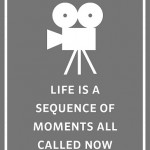 Quiet the phones, computers, iPods, iPads, and TVs. When they are disconnected, then we truly can connect to ourselves and our immediate world. Our story is not caught on film. We cannot rewind to this scene to understand something we missed. We cannot replay the conversation later to better hear what was said, or better respond. We cannot fast-forward to discover the hopes and sorrows of our tomorrows.
Quiet the phones, computers, iPods, iPads, and TVs. When they are disconnected, then we truly can connect to ourselves and our immediate world. Our story is not caught on film. We cannot rewind to this scene to understand something we missed. We cannot replay the conversation later to better hear what was said, or better respond. We cannot fast-forward to discover the hopes and sorrows of our tomorrows.
Obtaining authentic wellness means being in the moment as life unfolds. The scene is live, not recorded. And a meaningful performance reaps healthy rewards.
Sources
“Are You Obsessed with Being Busy?” by Kari Henley at www.livestylemom.com.
Image Credits
Rushing waters (introductory photo): http://www.flickr.com/photos/lisa_rific/4035542009/
Camera: http://www.flickr.com/photos/jessicatam/6104513405/
Texting in a view: http://www.flickr.com/photos/12485267@N06/5069286386/
Time for life: http://www.flickr.com/photos/jessicatam/6104513265/in/photostream/
Technology overload: http://www.flickr.com/photos/shoutsfromtheabyss/6199518254/
Exercise ball: http://www.flickr.com/photos/cumidanciki/5163310087/
Sequence of moments: http://www.flickr.com/photos/jessicatam/6105059772/in/photostream/
 Fitness & Wellness News Your Source for Fitness News, Wellness News, Health News, and Nutrition News!
Fitness & Wellness News Your Source for Fitness News, Wellness News, Health News, and Nutrition News!




